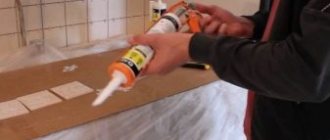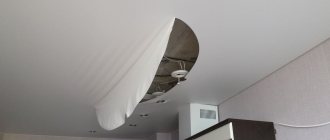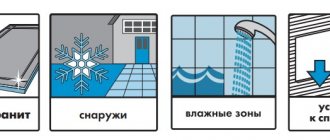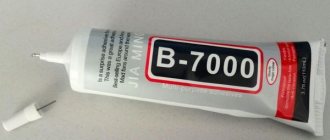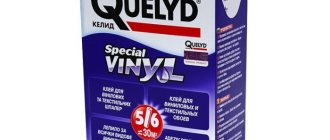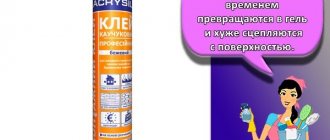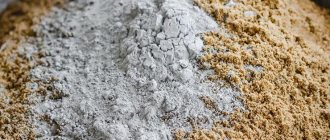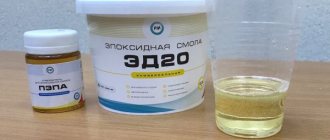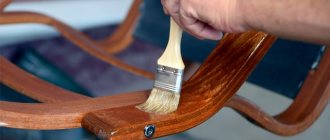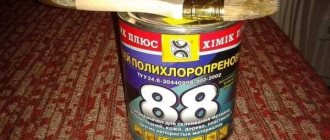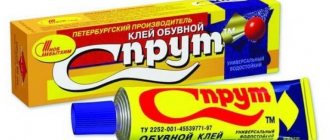Many owners of apartments and houses choose foam tiles as ceiling finishing. This facing material quickly sticks to the ceiling and does not require special care. In addition, the tiles have a reasonable price and a wide variety of decoration options, which is why they are quite popular. The material is usually glued to the base. Adhesive for foam ceiling tiles should not contain solvents that will melt the foam. When choosing a solution for gluing, take into account the material and characteristics of the base. To understand which glue to use on ceiling tiles in your case, you need to consider the characteristics of different compositions.
The choice of adhesive depending on the characteristics of the base
When listing what is best for gluing ceiling tiles, it is worth mentioning the following adhesive mixtures:
- Solvent-based substances quickly glue surfaces. They are produced on the basis of thermoplastic liquid polymers and special additives.
- Water-based formulations are the most popular. But they take a very long time to dry, which is inconvenient when working on the ceiling (you have to hold the tiles for a long time). These substances are not used in cold rooms. In addition, the water base is a favorable environment for the development of microorganisms, so the base surface needs antiseptic treatment.
- The silicone-based compound dries quickly. The main disadvantage is that after preparation the glue is usable for a short period of time.
- Melt. This is a special glue that is heated to the required temperature before use, so you will need a special heat gun for the job.
- A separate point worth highlighting is liquid nails. These are water-based or solvent-based mixtures that are most often used by professionals. However, water-based solutions are not suitable for use in rooms with wet processes, although they are environmentally friendly and do not harm health.
Attention! Any ceiling adhesive is not suitable for gluing tiles to a ceiling with chalk whitewash, so the base must be cleaned down to the concrete floor.
Each of the above compositions is suitable for working with cement, wood, concrete, plasterboard or gypsum base. As for metal bases, water-based mixtures cannot be used to work with them, since they lead to corrosion processes.
It is recommended to prime the ceiling surface before gluing the finish. When choosing a primer, you should focus on the adhesive used. The primer must be made from the same components as the adhesive mixture to ensure good adhesion of the bonded surfaces.
Types of adhesives for ceiling finishing: consumption and characteristics
To glue polystyrene foam boards to the ceiling, use one of the following compositions:
- universal mixtures (these include the Format solution for working with polystyrene foam or Titan adhesive for ceiling tiles);
- hot melt adhesive;
- PVA;
- compound;
- solvent-based mixtures;
- acrylic putty;
- liquid Nails.
When choosing an adhesive mixture, pay attention to the following indicators:
- Quick drying and reliable adhesion to the base. For gluing to the ceiling, solutions that dry in no more than 30 seconds are ideal. The longer the glue takes to dry, the longer you will have to hold the tile with your arms up.
Important! Quick setting is also inconvenient, because after gluing it will not be possible to correct the position of the tile.
- If work is carried out in a residential area, then it is important to choose compounds that do not release harmful substances into the air.
- It is prohibited to use adhesive mixtures based on solvents such as toluene, white spirit and acetone, because they react with the foam and dissolve it.
- Use solutions with good viscosity to ensure reliable fixation of the element to the ceiling.
Glue Titan
Thanks to its high viscosity, the adhesive easily copes with fixing heavy glass and metal products on any surface, so it will securely fasten lightweight foam panels to the ceiling. The solution dries quickly, and the thickened mixture can be diluted for further use. It is important to know how to dilute Titan adhesive for ceiling tiles.
Suitable for these purposes:
- salicylic alcohol;
- denatured alcohol;
- ethanol.
Worth knowing! The minimum price of Titan glue for ceiling tiles is $3.5/l.
The consumption of Titan brand glue is small and amounts to 0.5 liters per square meter of surface. One container is enough to glue the coating over a large area, which is considered the main advantage. Additional advantages of Titan are transparency, moisture resistance, and stability of seams. When applied to tiles, the product does not stretch or deform.
The solution can be used for gluing finishing to a base made of gypsum, concrete, cement and other materials. Since the elasticity of the composition is not affected by external temperatures and humidity, Titan is suitable for use indoors and outdoors.
Glue Moment
The advantages of this expensive and high-quality mixture include the following:
- setting speed;
- good viscosity;
- reliability of the adhesive connection;
- suitable for working with expanded polystyrene;
- speed of work.
Since the glue is sold in a tube, you will need a glue gun to squeeze it out of the container. Another disadvantage of the Moment is its rather high cost. In addition, the consumption of the mixture is quite impressive and amounts to 6 kg/m².
Important! The price of Moment glue for foam ceiling tiles starts from $3.2/0.75 liters.
Liquid Nails
In the production of liquid nails, synthetic polymers and rubber are used as the basis. “Nails” glue homogeneous and foreign materials equally well. They are also suitable for gluing foam tiles.
The advantages of liquid nails are as follows:
- There are no components in the composition that aggressively interact with the foam and melt it.
- High drying speed.
- There are no visible marks left on the surface. The glue does not show through the finish.
- The solution does not change color or turn yellow over time. The adhesive seam is not susceptible to damage by microorganisms and mold. It does not rust and does not react to high humidity and direct contact with water.
- Water-based and solvent-based mixtures are available for sale. For residential premises it is better to use the first one, because it is considered harmless. But solvent-based liquid nails are suitable for use in places with changes in temperature and humidity.
Important! In addition to liquid nails, you will have to buy a construction gun to squeeze the composition out of the tube. The mixture is applied around the perimeter of the tile at a distance of 2-3 cm from the edge and in the center.
PVA glue
Water-based compositions with latex and acrylic particles harden quickly after the water evaporates and bond the bonded surfaces well. Since all water-based adhesives are recommended for contact use, the mixture is applied to the tiles and base.
Due to the contact method of connecting surfaces, the mixture is not suitable for use over a large area, because the time required to complete the work significantly increases, as well as the consumption of the adhesive mixture. But in a small room this glue provides many advantages - it is odorless and does not harm health.
Positive aspects of using PVA:
- ease of application (you can use a spatula or brush);
- good adhesion to any substrate, even plastered;
- thick consistency;
- reliable grip;
- optimal setting times, which allows you to change the position of the product;
- reasonable price (less than $1 per kilogram);
- economical consumption – 0.2 kg/m².
Important! The only disadvantage of PVA is that it takes a long time to dry, so you will have to press the tiles to the ceiling with your hands for a while.
Specifications
"Titan" glue does not lose its quality characteristics, even if it is used at different ambient temperatures. The composition is characterized by resistance to direct sunlight and excellent elasticity. After gaining strength, it does not become brittle and is not prone to delamination. Environmentally friendly, does not contain substances harmful to the human body.
Glue properties:
- used for indoor and outdoor work;
- suitable for gluing almost any materials;
- economically used;
- ideally glues polystyrene foam;
- the seam is waterproof and elastic;
- colorless, transparent;
- sold completely ready for use;
- does not contain substances harmful to the human body;
- the elasticity of the composition does not change under the influence of different climatic conditions.
Why does glue show through the tiles, and what to do?
When gluing very thin stamped tiles, the adhesive with a rich dark color may show through the coating. But in some cases, even white glue can be visible through the surface of the tile if it is glued to a dark base. Some adhesive solutions may change color during use and lead to this defect.
In any case, it is not difficult to correct the situation by painting the ceiling covering. For stamped boards, you can only use water-based emulsion, and extruded panels can be painted with paints that do not contain aggressive solvents.
Now you can decide for yourself which adhesive is best for ceiling tiles. The main thing is to take into account the features of the base, the purpose of the room and the temperature and humidity processes in it. It is also worth remembering the consumption of the adhesive mixture and taking into account the surface area.
Source: build-experts.ru
PVA glue
PVA (polyvinyl acetate) glue is one of the most common, used for gluing materials such as wood, ceramics, linoleum, chipboard, paper, glass, textiles, natural and artificial leather. PVA is widely used due to its excellent adhesive properties, good adhesion to surfaces, resistance to moisture, solubility in water and, last but not least, low cost.
There are several types of PVA glue:
- Stationery - used for gluing paper and cardboard;
- Household (wallpaper) – used for gluing paper products and wall surfaces (plaster or wood);
- Construction - used for gluing materials with a base made of fiberglass, vinyl or paper, added to primers in order to increase manufacturability and adhesion of subsequent materials (putties, plasters or dry mixes);
- Super M - used for vapor-permeable materials, ceramics, porcelain, fabrics, glass, leather, as well as for fixing floor coverings;
- Extra - used for gluing wood, plywood, construction mesh, wallpaper, sickle sheets or as an additive to increase strength characteristics;
- Universal - for gluing paper or decorative elements made of paper or plastic to wood, glass or metal.
Let's try to answer the question, how to dilute PVA glue? It is recommended to dilute household and office PVA glues with warm water with vigorous stirring. The use of other solvents may affect the properties of the adhesive. In case of severe thickening - the formation of a crust on the surface or dry flakes, these crusts and flakes are removed. When diluting PVA, it must be remembered that a large amount of water will reduce the adhesive strength and ductility will also decrease.
To dilute universal and office glues, when they thicken, use acetic acid or organic solvents such as acetone, methanol, ethyl acetate, benzene.
Glue 88
There are three types of glue 88: 88-CA; 88-NP; 88-N, each of which has its own area of application:
- Glue 88-CA is moisture resistant, used for products in contact with aquatic environments, both fresh and salty, and withstands significant temperature changes. Finds application in construction, footwear, aviation and automotive industries. Used for linoleum flooring. Contact of the adhesive with steel and aluminum surfaces does not cause corrosion, and there is no release of toxic compounds.
- Glue 88-NP - used for gluing rubber made on the basis of rubber to metal, wood, glass, leather, concrete and various surfaces, and for gluing rubber products. The advantages of the glue include moisture resistance, resistance to temperature and the absence of corrosion of steel and aluminum.
- Glue 88-N is used for gluing vulcanizing rubber to products made of metal, wood, plastic, glass and concrete. Recommended for gluing polyisobutylene to metal and concrete.
When it dries or thickens, the question arises - how to dilute glue 88. For dilution, it is recommended to use benzene, the amount of solvent is determined visually - to the state of liquid sour cream and so that the glue does not flow off the brush and does not drag on it (video).
How to wash?
From the skin
When working with super glue, it often gets on the skin of your hands. If the adhesive gets on your skin, you can’t just get rid of it; you can’t remove it with soapy water. There are three ways to remove the super-substance from the skin of your hands.
For this, as a rule, they use:
- acetone: rub the contaminated area well, and then wash your hands with soap;
- pumice stone: steam your hands and then gently rub the area with pumice stone;
- table salt: wet your hands and pour a large spoonful of salt into your palms, rubbing it until the dirt comes off.
These methods can seriously damage the skin of your hands; after manipulation, you need to apply lotion or hand cream to your skin.
From metal
It is very difficult to remove the super-substance from metal. You can try to scrub the metal surface using acetone or another solvent containing volatile substances, but they do not have time to adhere to the material.
To completely get rid of dirt, apply solvent or acetone to a cotton pad or thick cotton cloth, apply it to the stained area, and stick tape on top. As a result, an airtight environment is created, the adhesive inside will heat up and its remains can be easily removed after removing the tape.
From linoleum
Super glue often ends up on linoleum. To remove it, you should resort to chemical solvents. To clean the surface, choose “Super Moment Anti-Glue”, “Anti-Glue” or “Contact”. When they are applied to a surface, the glue begins to dissolve and turn into a rubber-like substance that is easily removed.
If you don’t have the time or opportunity to run to the store, gasoline is used to remove glue from linoleum. If the stain is already old, you need to wait a few minutes until the glue begins to dissolve. Residues are removed with dry wipes. Sometimes it cannot be removed the first time, then the procedure should be repeated.
When working with gasoline, you should follow safety precautions, as the substance is flammable. There should be no children in the room while working. After working with gasoline, the surface is washed with water.
When buying linoleum, you should read the instructions and find out what products are suitable for its surface. If you have a small piece of linoleum, you can do a test test on it: spread it with glue, and then try to remove it using different means. To clean linoleum, you can use gasoline or ammonia. Do not use acetone for cleaning: it can damage the surface.
From plastic
Very often the question arises of how to remove traces of glue from plastic surfaces. When working with this product, you should be very careful and try to immediately remove drops of glue from the plastic with a regular cloth. After removing the stain, wash the surface with dishwashing detergent.
Plastic does not tolerate temperature changes well, and can also be damaged when using certain chemical solvents, so do not use acetone or gasoline for plastic surfaces.
If the glue on the plastic surface has already dried, you can try to cut it off very carefully. You can also use Dimethyl Sulfoxide to remove adhesive from plastic.
You can buy it at any pharmacy
You can also use Dimethyl Sulfoxide to remove adhesive from plastic. You can buy it at any pharmacy.
From glass
As with any other surface, it is always easier to remove fresh dirt from glass: just wipe it with a cloth.
For glue that has dried on the base, use:
- cleaner: it is applied to the glass, after a few minutes it is removed with a knife;
- white spirit: it is applied with a damp disc to the glass, after 15 minutes the softened glue is removed with a stationery knife;
- vegetable oil: apply it for 1 hour, then remove it with a plastic spatula or spatula;
- liquid soap, dish soap: add a little composition to water, apply the soap solution to the glass and rinse off with a dish brush.
You can also remove glue from glass using ammonia and dishwashing detergent: take them in equal proportions and apply the mixture to the stain for 1 hour. After this, the contamination is removed and the glass is wiped with a solution of ammonia in the ratio: 1 tbsp. l alcohol per 0.5 l. water.
Glue Titan
Titanium glue is a universal glue, which is explained by its high technological properties. Titanium can be used for gluing products made of foam plastic, wood, PVC, leatherette and others. It has proven itself well for installing finishing elements on surfaces made of concrete, wood, plaster, including ceiling tiles. The adhesive can be used for external and internal work; the connection is characterized by elasticity, moisture resistance and frost resistance. Eco-friendly because does not contain solvents hazardous to health.
If Titanium has thickened, you can use alcohol, including salicylic acid or denatured alcohol, to dilute it. In its liquid state, Titanium does not bond well, but can be used as a primer. Craftsmen, when advising how to dilute Titan glue, can point to nail remover. It should be borne in mind that the use of isopropanol-based nail remover may cause the glue to curdle (photo).
Glue Moment
The moment is also extremely popular when carrying out construction and renovation work.
The range of its application is large. To dilute Moment, acetone and dimethyl sulfoxide, freely available in pharmacies, can be used.
Tile adhesive
Anyone who is busy renovating an apartment needs to know how to choose tiles and adhesive for them, and how to glue the tiles efficiently and quickly.
There are three types of tile adhesive:
- based on cement, for its preparation it is necessary to carefully observe the proportions and follow the instructions;
- ready-made one-component glue, sold in the form of a ready-made paste, does not dry out for a long time;
- two-component glue. Prepared immediately before use. Its advantages include elasticity and manufacturability.
To properly prepare tile adhesive, you should know a few rules:
- the temperature of the components should be approximately equal, i.e. You cannot bring the mixture from the cold and fill it with hot water;
- add water to the mixture in small portions with thorough mixing;
- During operation, it is necessary to periodically stir the finished glue to prevent delamination.
Tile adhesive must be diluted with warm, clean water. Number of mixture components: 5 liters of water account for 20 kg of dry mixture.
Source: kleigid.ru
Description and properties of Titan glue
Titanium adhesive is in demand on the market due to the quality of surface bonding and excellent technical characteristics:
- Effective for gluing most building materials.
- Suitable for both indoor and outdoor use.
- Resistant to mechanical stress, ultraviolet radiation, and temperature changes.
- It is water resistant.
- Elastic after drying.
- Eco-friendly (does not contain toxic components).
- Use sparingly.
The composition is suitable for gluing wood (including parquet), glass, leather, linoleum, ceramic tiles, polystyrene foam, expanded polystyrene, brick, gas silicate blocks, and also provides reliable adhesion to plaster and concrete.
If we talk about disadvantages, consumers mainly pay attention to the “death grip”, which in some cases turns from a plus into a minus.
Classification by composition
All Titan glue is also classified according to its composition, the substance used for its manufacture. The type of adhesive being produced and the ability to bond different materials depend on this.
- Polyurethane. The glue made from this chemical has antifungal and anti-mold properties. Due to this, it is most often used for wallpapering. Suitable for joining mineral wool, bitumen, thermal insulation boards;
Types of glue
Titan glue is available in several forms: in addition to universal Titan, the manufacturer offers liquid nails, wallpaper glue, styrofoam glue, sealants, acrylic glue and much more.
Universal glue
Universal mounting adhesive Titan is suitable for gluing PVC, polystyrene foam, linoleum, carpet, glaze, ceramics, leather, as well as wood and parquet. Very often this glue is used for installing ceiling tiles.
It is convenient to apply the composition in a thin layer directly from the tube; it sets quickly, plus when it dries it remains transparent and therefore invisible. Does not lose elasticity from -30 to +60 °C, is not afraid of either moisture or sunlight, confirming its versatility.
Mode of application.
Before application, the surface must be cleaned, leveled and dried. Next, apply the composition to both surfaces in a thin layer, wait a few minutes until it dries a little, and connect the parts to be glued (press for 5-10 seconds). The glue hardens in 40 minutes and reaches maximum strength in 24 hours.
Liquid Nails
Titanium liquid nails are available in tubes of 200 and 310 ml (the latter are equipped with a mounting gun) and are a white paste. They are a replacement for nails and screws.
Titan Wild liquid nails are perfect for gluing metal, PVC, wood, cork, tiles, plaster, brick, cement, decorative stone, polyurethane and polystyrene foam, etc.
Important: the composition is not suitable for polypropylene, polyethylene and wet surfaces.
The composition is applied in a thick layer to the entire surface, the excess is removed with a sponge, initial setting occurs after 15 minutes. The glue does not lose its properties even after freezing.
Powder glue (for wallpaper)
Titan wild powder adhesive is a universal composition for wallpapering. The glue has antiseptic properties, which prevents the appearance of mold and mildew. In addition, due to the special composition, the wallpaper can be adjusted directly on the wall.
The product line includes three adhesives for different types of wallpaper: “universal” for paper, “non-woven” and “vinyl”.
The powder is diluted with water until homogeneous, and then applied to the canvas (or to the wall, in the case of non-woven fabric) from the middle to the edges. Before gluing, you need to let the composition set a little for 5-10 minutes. Diluted glue can be stored for no more than 1 month.
Styrofoam glue (Titan mastic)
Titan Wild adhesive mastic is used primarily for gluing ceiling tiles, baseboards, decorative elements, as well as products made of polystyrene foam, polystyrene foam and polyurethane. The composition has a high level of adhesion to concrete, cement, gypsum, plaster, wood, plywood and fiberboards.
Styrofoam adhesive can also be used to level the substrate and fill cracks and other surface imperfections before installing polyurethane products.
The composition is resistant to external influences, including sub-zero temperatures and ultraviolet radiation. It contains no solvents or toxic substances, so it is safe for humans.
Important! The glue must be mixed before use.
The composition is applied with a spatula to a cleaned and degreased surface. It is better to work at a temperature of at least +8°C. The glue sets in 15–20 seconds, but during the first 10 seconds the position of the object can be adjusted. It should take about 12 hours for it to dry completely.
Sealants
Titan Wild sealant (universal silicone) has reliable adhesion to concrete and foam concrete, stone and brick, PVC, wood, plaster and metals. It also effectively glues gypsum boards, and also fills gaps, cracks, seals seams, etc.
Like other compounds in the Titan Wild line, the sealant is resistant to various weather conditions and temperature changes from -40 to +80 °C. It can also be painted after drying.
The sealant is applied in a single layer using a construction gun.
Instructions for use
Titan adhesive consists of vinyl acetate copolymers, which are dissolved in organic solvents. Available in plastic bottles with capacities from 250 ml to 1 liter. The volume may be larger for industrial applications. The product is used only on specially prepared dry and clean surfaces. Shelf life – up to 1.5 years.
"Titan" is an adhesive with a good set of positive properties:
- high resistance to moisture;
- resistance to high and low temperatures;
- flexibility, transparency;
- low consumption;
- ease of gluing tiles to the ceiling;
- sets quickly;
- ideal for interior work.
The composition of the product does not include substances hazardous to human health.
When working with construction adhesive, you should be careful and avoid getting it on mucous membranes and the body. If the product accidentally gets into your eyes or mouth, you should immediately rinse them with running water, and if necessary, seek medical help. In the room where repair work is carried out, there must be ventilation. The glue should only be stored in a place that is difficult for children to reach.
One package of such a product will replace many types of glue, simplify and speed up repair work. Before applying glue, the surface must be thoroughly cleaned and dried. If the surface is porous, apply several layers of the product.
Be sure to free the ceiling or walls from the old whitewash and apply a layer of primer, otherwise the properties of the glue will change.
"Titan" for the ceiling
For ceiling tiles, “Titanium” is consumed in smaller quantities; it is applied with a dotted line. The ceiling must be cleaned of dirt and degreased. The tiles are connected to each other after the glue dries a little for 2-5 minutes. It takes a little less than an hour for the construction adhesive to dry completely. The work will be completely ready in a day. After use and complete drying of the product, a transparent, even seam remains, which is almost invisible. Ease of use and quick results make the glue an ideal option for this type of work.
Main technical characteristics
Purchasing universal glue will be an excellent budget saver, because it can be used in any home. The surface coupling area is highly resistant to frost, wind, water and other atmospheric influences. Often, during renovation work, they buy separately a means for gluing tiles, linoleum, and polystyrene foam, but Titan Wild glue and its other varieties solve all problems at once.
Types of glue
Titan glue is available in various forms: universal glue, mastic glue and liquid nails. Instructions for use must be printed on its packaging.
Universal adhesive is usually used for gluing polystyrene foam, PVC, parquet, wood, and linoleum. It is squeezed out of the sealed package in a thin layer through a dispenser. After drying, the seam becomes invisible. Apply to a dry, pre-cleaned surface. The glue is transparent, water- and heat-resistant, sets quickly and remains flexible. Drying time less than 1 hour. These characteristics make it especially popular when installing ceiling tiles.
Adhesive mastic "Titan". Glues concrete and cement, gypsum and brick, wood and plasterboard, fiberboard and chipboard, polystyrene foam and polystyrene foam, and all materials together, in any variations. Suitable for leveling surfaces and gluing decorative tiles. Requires stirring before use.
Liquid nails "Titanium". Available in cylinders with fastenings for a mounting gun. This type of adhesive composition can be used in a very wide temperature range, so it is successfully used both indoors and outdoors. Perfectly glues metal, ceramics, polyurethane, PVC, wood.
Release forms
The polymer product is available in different forms depending on its purpose.
TYTAN mounting adhesive is made from synthetic resins and is suitable for gluing various mirrors to any surface. The advantage of the product is that it does not harm the fragile and sensitive mirror and works reliably with many materials. The glue is beige in color and has a shelf life of one year.
Titan Wild glue is resistant to high and low temperatures. The product is suitable for all non-inert materials, therefore it is used almost everywhere.
For gluing foam plastic, there is a special type of glue that is used for thermal insulation work. The composition is easy to use, sets quickly, and does not require additional dilution. Works well with polyurethane boards and other thermal insulation materials. The product simplifies the work and glues the slabs extremely firmly.
Titan foam also helps to insulate any room, which comes in a package with a reliable modern valve. The foam is in a cylinder and is used to fill various joints, insulate facades and roofs. Modern packaging helps to significantly reduce material consumption.
- Mounting adhesive for ceramics and stone
Eco-friendly special purpose Tytan adhesive for ceramic materials and stone sets very quickly. This type is used for gluing to wood, drywall, and other surfaces that quickly absorb glue.
Titan glue is available in several types, each of which has a different purpose.
Universal. It is moisture and heat resistant, forms a transparent adhesive seam, which becomes invisible after drying. Used for gluing parquet, polystyrene foam, linoleum, PVC, wood.
It is squeezed out of a hermetically sealed package in a thin layer through a special dispenser. Apply to a previously cleaned, dry surface. Dries in 40 minutes, maximum adhesion strength is achieved after 24 hours.
All of the listed properties make the Titan universal adhesive an indispensable tool for installing ceiling tiles. Apply the compound to the tile in a thin, broken line, let it dry for a few minutes and press it to the ceiling.
Adhesive mastic is designed for gluing polyurethane and expanded polystyrene. Can be used to level surfaces and for ceiling tiles (to glue them).
Excellent bonding to concrete, brick, wood, fiberboard and chipboard substrates, as well as plastered and cement-lime surfaces. The listed materials are glued together in any variations.
Apply to the surface dotted with a spatula and apply to the base. Within three seconds the position can be adjusted. The adhesive mastic sets within 20 seconds and dries completely in 12 hours.
Liquid Nails. The adhesive is a white paste with a high setting speed and excellent elasticity. Effectively fastens steel, ceramics, polyurethane, mirrors, wood and PVC; it can be used indoors and outdoors at ambient temperatures from -30 to 60° C. Sold in cylinders that have fastenings for a mounting gun.
Liquid nails are applied in a thick layer over the entire surface. This feature allows you to glue finishing materials to ceilings that have significant defects.
For wallpaper. The glue comes in powder form, which must be dissolved in water before use. The mixture contains antiseptics that prevent the appearance and development of fungus and mold. Using Titan glue you can install any wallpaper.
Adhesive foam. It is characterized by high adhesion to mineral substrates, productivity and efficiency. It is used for laying foam and gas silicate blocks, foam and gas silicate, ceramic and silicate bricks.
Maximum adhesion occurs after 120 minutes; if glue obtained from a dry mixture is used - after 24-36 hours. The composition can be worked at an ambient temperature not lower than -10° C.
The packaging of each type must contain instructions for using the adhesive mixture.
How to use Titanium glue when finishing a ceiling
Decorating the surface with different types of decorative tiles will not only give the ceiling an interesting and unique look, but will also allow you to maintain its height. It is important to choose the right adhesive composition, because the speed of execution and the quality of the work depend on it. The main requirements for the technical characteristics of the adhesive are safety, transparency, viscosity, fast setting speed and versatility. The characteristics of Titan glue fully comply with these requirements.
Before you start gluing the facing material, it is necessary to prepare the surface well, because the final result of the work greatly depends on this. It should be borne in mind that if the ceiling has significant differences in height, then the ceiling tiles will not be able to hide such a defect, and it is more advisable to choose another finishing method, for example, a tension or hanging coating option.
Relatively smooth surfaces should be treated as follows: first seal the seams between the slabs, then clean the surface of the old coating. To do this, use a spatula to remove the whitewash, and then apply a primer for better adhesion of the adhesive composition to the surface. Whitewash that is difficult to remove can simply be deeply primed. It is recommended to wipe a ceiling that is not whitewashed with a damp sponge. If the polystyrene tiles are very thin, then there is a chance that defects in the ceiling will show through, so you should apply finishing putty to it, followed by a primer. When the ceiling is dry, you can start gluing.
How to dilute
If the glue has thickened, it should be diluted with medical alcohol. The liquid composition penetrates better into small cracks, but takes longer to dry.
Source: opotolkax.com
How to dilute titanium glue if it has thickened
What glues and what can be diluted with it
The technical characteristics of the glue determine its wide range of applications. The Titan Wild composition glues parquet, glass, ceramics, paper, wood, linoleum, as well as natural and artificial leather. Ideal for attaching foam and polystyrene foam. The universal composition allows you to glue dissimilar materials.
If the glue has become too thick, it can be diluted with medical alcohol. The liquid consistency allows for better penetration into small cracks, but this glue takes longer to dry.
